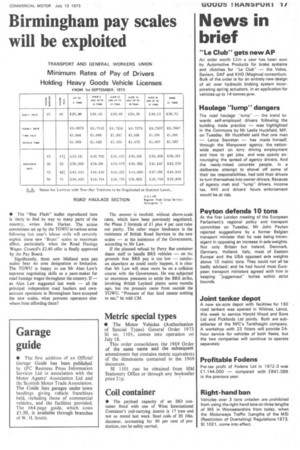• The "Blue Flash" leaflet reproduced here is likely to
Page 19

If you've noticed an error in this article please click here to report it so we can fix it.
find its way to many parts of the country, writes John Darker. The action committees set up by the TGWU in various areas following last year's labour strife will certainly exploit these new "Brum" scales to maximum effect, particularly when the Road Haulage Wages Council's £2.40 offer is finally approved by the Pay Board.
Significantly, these new Midland area pay scales bear no area designation or limitation. The TGWU is happy to use Mr Alan Law's supreme negotiating skills as a pace-maker for
road haulage wages throughout the country. If-as Alan Law suggested last week all the
principal independent road hauliers and ownaccount operators in Birmingham have accepted the new scales, what prevents operators elsewhere from affording them? The answer is twofold; without above-scale rates, which have been previously negotiated, the Phase 2 formula of £1 plus 4 per cent rules out parity. The other major hindrance is the resistance of British Road Services to the new scales at the insistence of the Government, according to Mr Law.
If the planned refusal by Perry Bar container depot staff to handle BRS vehicles on the grounds that BRS pay is too low catches on elsewhere as could easily happen, it is deal that Mr Law will once more be on a collision course with the Government. He was subjected to enormous pressures to settle the BRS strike, involving British Leyland plants some months ago, but the pressure came from outside the TGWU. "Pressure of that kind means nothing to me," he told CM.
































































































